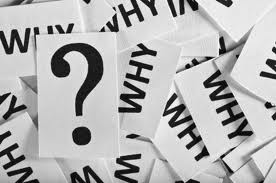Self-Harm and Asking "Why"
Have you ever asked yourself, "Why do I self-harm?" or "Why do I let things trigger my self-injury behaviors?"
The word “why” varies from being a good and a bad word. As a kid, you constantly ask why because you want to know about the world you live in: “Why is the sky blue” or “Why is your hair curly?” As a child, that word is part of life and learning and discovery. The word is natural. Sometimes, if we never asked why, we’d never know.
However, sometimes asking why can become a stressor when struggling with death, disease or self-injury and mental illness.
Growing up, I’ve asked the question “why” for numerous reasons: “Why did I have to have cancer?” “Why did I start cutting?” “Why did my brother have to die from a disease I survived?” Growing up and asking those questions not only brought forward awful headaches, but also brought forth negative energy that stuck to me like glue. I know that this question is one that shouldn’t be asked in this sense, but sometimes it is hard not to.
Why Me and Why Self-Harm?
Five years ago, when I was still cutting, I always asked, “Why did this addiction choose me?” At the time, I couldn’t see that I was really the one who had chosen it, not vice versa. Back then, I’d wonder why I couldn’t just stop cutting and why others didn’t understand. “Why” was a word used in my daily language and many others may see this as an issue they struggle with also.
This can also be seen as the “Poor Me” scenario. By asking “why me,” you are also making yourself look insecure and weak without realizing it. To this day, when I use the word “why” in this context, I try to tell myself after that it wasn’t worth asking the question and thinking that way.
Why, you dare to ask? Because everything happens for a reason.
What Can We Do About “Why”?
Since asking questions has been instilled into our behaviors since we were toddlers, it is not easy to just convince ourselves, once and for all, to stop asking “why” when we shouldn’t.
Plus, that is not realistic.
The only thing that can be done is to recognize when the question comes up and use self-talk afterwards. After asking a question like, “Why did my parents have to get divorced,” stop and think for a second. Tell yourself that it isn’t worth the worry because it happened to make you stronger. If you ask, “Why did I have to burn myself last night,” tell yourself that it happened in the past, it was not a good idea and you’ve learned from it.
The word is a sneaky little guy and asking these questions can make you more stressed. Of course, it can be helpful to stop and think about a difficult situation in a similar way. However, the thinking must be positive and useful, not heavy and overbearing.
If you’re going to ask “why”, maybe stop and use the word “how”. “How can I learn from this?” “How can I do better?” Replacing the word just may take some of that stress off your back. We all know we could use that.
You can also find Jennifer Aline Graham on Google+, Facebook, Twitter and her website is here.
APA Reference
Aline, J.
(2013, August 16). Self-Harm and Asking "Why", HealthyPlace. Retrieved
on 2026, January 13 from https://www.healthyplace.com/blogs/speakingoutaboutselfinjury/2013/08/self-harm-and-asking-why
Author: Jennifer Aline Graham
Thanks, Jennifer, for you post! I ask "why" so much that it can keep my head spinning. Perhaps my OCD adds to this. My specific "why" question is, "Why am I like this?" I will search my past -- how my parents raised me especially, as well as past experiences -- to figure out how I got this way (how I developed my mental and emotional issues). All of this question asking keeps me in the past and I fail to live the present. I like your suggestion to replace "why" with "how." I do believe that God works out everything for the good of those who love Him and are called according to His purpose. I know that, with Him, I can turn all of my difficult experiences into something good that can benefit me and others. I've actually thanked Him for my OCD and am seeking -how- to help others.